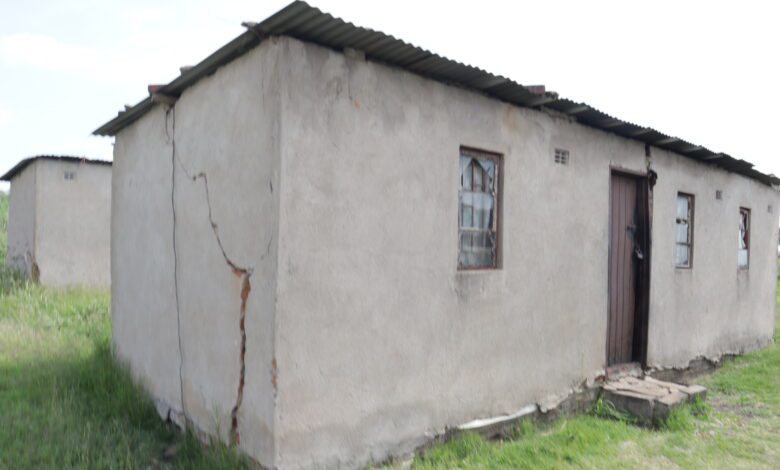We were duped: Harare residents settled on wetlands fear eviction

Bright Mayengahama, 38 sits outside his home as he gazes into the cloudy sky, threatening a heavy downpour, in Monaville a suburb North of Harare.
Mayengahama is one of thousands of Harare residents who have dared to build on wetlands.
His one-roomed house is already showing signs of cracking due to the moisture beneath the earth’s crust. A huge crack has formed on the front part of the house, a worrisome situation for the father of two.
He settled in Monaville, one of Harare’s most contentious suburbs that sit on vast swathes of wetlands.
The onset of the rainy season causes Mayengahama sleepless nights as he fears waking up one day in a pool of water.
He moved to Monaville from Budiriro, west of Harare in search of a better life as a house owner.
Buying the stands was no mean task as he had to part with US$2 000 for 200 square metres of land where he built a one-roomed house.
The bogus land developer however disappeared without regularising his stay in the area.
“I settled here five years ago. I feel I am now a house owner, but I have not been given anything to show that I own this place. I hear the council is destroying structures built on wetlands, maybe this will be my fate also,’ he said as he made a cursory gaze into the sky where large dark clouds were forming.
“The cracks you see are due to the water which is beneath the surface,” he said.
“Whenever it rains, the houses on our property are covered in water for days before the rains subside. It is painful living in such a place but what can we do. I have nowhere to go,” he lamented.
A few paces from his house Nyaradzo Musimani, 30 is drying her children’s clothes.
He settled in Monavile five years ago with her husband and the couple does not have documents to their “property”.
They are living precariously, fearing the day the council will demolish their houses.
“I feel like we were duped, I do not have papers to show that this is my home. I do not know how long I am going to stay here,” she said.
Monaville is one of Harare’s biggest wetlands protected by the Ramsar Convention which came into effect in 2013.
Wetlands are natural water reservoirs. They are used to recharge the water table, filter and purify water and prevent soil erosion.
Zimbabwe currently has 7 sites designated as Wetlands of International Importance (Ramsar Sites), with a surface area of 453,828 hectares.
Property developer, Sharadkumah Patel has been dragged before the courts by Cosmo Trust, the Environmental Management Agency and others for pushing to parcel out land in the area.
The court battle which dates to 2019 was this week revisited when the Supreme Court upheld a decision to nullify an environmental impact assessment and development permit that had been obtained by a Harare developer.
The Indian developer had obtained the property developing rights unprocedurally, according to lawyers.
“Today’s important judgment is perhaps the most far-reaching judgment by our Courts on procedural issues relating to environmental law. Privileged to have successfully argued a case with the Zimbabwe Lawyers For Human Rights. Climate change & environmental degradation are humanity’s big challenge,” lawyer, Tendai Biti Law said after the judgement.
Development on wetlands has been subject to growing disputes between council and land developers, most of whom are connected to Zanu PF.
The legal victory is among a few joys for environmental activists clamouring for the respect of wetlands.
With wetlands in Harare disappearing and housing structures sprouting, investigations show tacit collusion between politicians and land developers.
Zanu PF legislator Philip Chiyangwa’s Pinnacle Holdings has also been parcelling out land in Monaville’s wetlands. His company Pinnacle, has been subject to legal battles, some of which are still before the courts.
Observers believe Chiyangwa uses his political muscle to parcel out stands.
Sprawling housing structures are sprouting around the wetland.
Taking advantage of land thirsty residents, the area is already oversubscribed with lush structures.
But the effects of building on wetlands are being felt as cracks on the houses have begun to form.
A drive around the area shows patched perimeter walls and paint peeling off, due to the moisture.
Residents say rainy seasons are the worst.
Specialised, reinforced foundations are required before the structure is built but due to lack of resources, most residents build on ordinary foundations.
“I moved here three years ago. Everything is fine until it starts raining. We find ourselves in a pool of water and cannot complain because we brought ourselves here,” Gladys Muradzikwa who built her sprawling 7 bedroomed house near a stream said.
Apart from individual property developers, Housing Cooperatives, aligned to Zanu PF have been parcelling out land on wetlands.
Unsuspecting and desperate land seekers have lost thousands to cooperatives who thrive on patronage.
Harare Mayor, Jacob Mafume confirmed council battle with housing cooperatives in Harare. He said the menace of sprouting housing structures is as a result of political patronage.
“The cooperatives do not come from the council. They are named under Sally Mugabe, Herbet Chitepo and that shows their parentage. We do not deal with cooperatives. They have become a looting vehicle where land barons cover their tracks through a thin veil of being a cooperative. Cooperatives are trojan horses of political power, patronage and primitive accumulation,” Mafume said.
He said while the council had been fighting to protect wetlands, the government had, through the lands ministry, worked against the council policy.
““A number of wetlands have been occupied. There is a dual responsibility from council and from government to see which areas should be protected. This dual jurisdiction creates a loophole where sometimes developers get environmental certificates from EMA and once they get the certificates, as a council we cannot stop them from developing. So what is required is to harmonise and put everything under council in line with devolution,” Mafume said.
“Our policy is to protect wetlands. When people are building there is a lot of political power behind them. Council is prevented from demolishing structures because they are protected.”
Investigations show that Harare has dozens of wetland housing developments, involving top oligarchs.
In Eastlea, several housing developments have been sprouting in the wetland along Robert Mugabe Road over the last ten years. EMA has also confirmed that there is no Environmental Impact Assessment in place with the Harare Wetlands Trust already taking legal action against political figure Jane Mutasa.
In a report by the Harare Wetlands Trust, about 17 wetland housing developments are happening in Harare without due procedure. The report also shows that Environmental Impact Assessments have not been made available, making the structures illegal.
“Permits continue to be issued to allow for development on wetlands, including on Ramsar Sites. The Ramsar Convention, though binding on the State, is yet to be domesticated into Zimbabwean law. The state has not made use of the legislation to acquire or gazette wetlands, to establish nature reserves and prohibit development on them, which would do away with the issuance of permits such as EIA certificates and wetlands utilisation certificates, which are legitimizing the loss of the wetlands,” reads the report.
“The authorities are called upon to apply the legislation more rigorously to restrict, suspend and revoke the issuance of permits, and the Honourable Minister is called upon to amend the legislation to provide greater protection for wetlands,” Harare Wetlands Trust Programmes Mananger Selestino Chari said.
Zimbabwe is a state party to international conventions such as the Convention on Biological Diversity, and most importantly, the 1971 Convention on Wetlands of International Importance especially as Waterfowl Habitat (the Ramsar Convention) in terms of which the state has designated seven wetlands as wetlands of international importance. The Ramsar Convention requires establishment of Nature Reserves on wetlands, ‘wise use’ of wetlands and conservation of Ramsar Sites.





